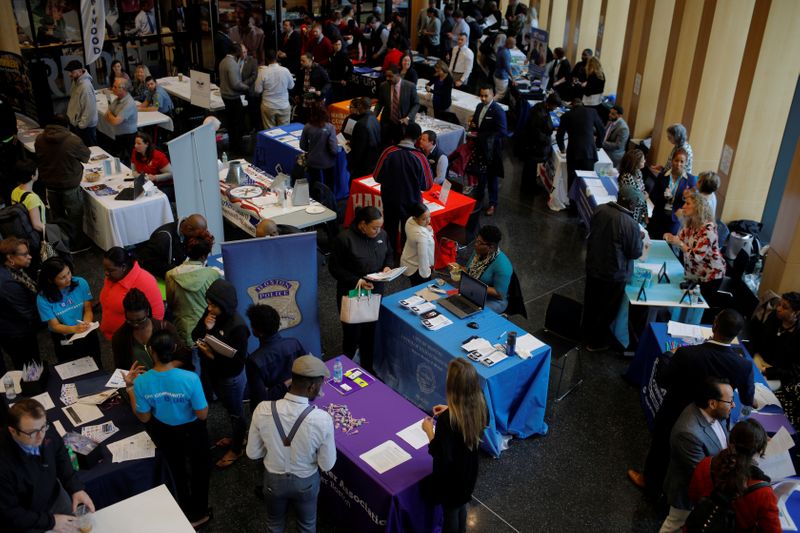By Lucia Mutikani
WASHINGTON (Reuters) - U.S. services sector activity jumped to a one-year high in February, suggesting strength in the economy before a recent escalation of recession fears ignited by the coronavirus epidemic that prompted an emergency interest rate cut from the Federal Reserve.
The economy's solid fundamentals were also underscored by other data on Wednesday showing private payrolls increased more than expected in February, in part as unseasonably mild weather bolstered hiring at construction sites and in the leisure and hospitality industry. A report from the Fed described the economy as growing at "a modest to moderate rate over the past several weeks," but noted rising concerns over the coronavirus.
The U.S. central bank on Tuesday slashed its benchmark overnight interest rate by a half percentage point to a target range of 1.00% to 1.25%, in the Fed's first emergency rate cut since 2008 at the height of the financial crisis. Fed Chair Jerome Powell said, "The coronavirus poses evolving risks to economic activity."
"Going into any potential coronavirus slowdown, the economy is in good shape," said Joel Naroff, chief economist at Naroff Economics in Holland, Pennsylvania.
The Institute for Supply Management (ISM) said its non-manufacturing activity index increased to a reading of 57.3 last month, the highest level since February 2019, from 55.5 in January. A reading above 50 indicates expansion in the services sector, which accounts for more than two-thirds of U.S. economic activity. Economists polled by Reuters had forecast the index falling to a reading of 54.9 in February.
The ISM said services industries remained "positive about business conditions and the overall economy," but also noted that "most respondents are concerned about the coronavirus and its supply chain impact."
The fast-spreading coronavirus has killed more than 3,000 people and sickened at least 90,000, mostly in China. In the United States, 10 people have died from the respiratory disease called COVID-19 caused by the virus and the number of infections exceeded 100, raising awareness of the disease among Americans starting the last week of February.
Investors fear the coronavirus epidemic could derail the longest U.S. economic expansion in history, now in its 11th year, through disruptions to supply chains and exports. The damage to the services sector is expected to come mostly through the transportation and tourism industries. Economists expect the coronavirus to restrain economic growth in the first half of the year to around 1.0%. The economy grew 2.3% in 2019.
The ISM reported on Monday that the manufacturing sector barely grew in February, with several industries saying the flu-like virus was impacting their businesses. So far, however, the vast services sector and labor market appear to be weathering the coronavirus storm.
Separately on Wednesday, the ADP (NASDAQ:ADP) National Employment Report showed private payrolls gained 183,000 jobs last month after rising by a downwardly revised 209,000 in January. Economists had forecast private payrolls increasing 170,000 in February following the previously reported 291,000 surge in January.
Labor market strength was reinforced by the ISM survey, which showed its measure of services industry employment increased to a reading of 55.6 in February from 53.1 in January.
The data and a near sweep for Joe Biden in the Super Tuesday Democratic primaries to choose a presidential candidate for the Nov. 3 election boosted stocks on Wall Street. The dollar firmed against a basket of currencies. The yield on the benchmark 10-year government bond hovered below 1.0%.
EMPLOYMENT REPORT EYED
The ADP report, jointly developed with Moody's Analytics, was published ahead of the government's more comprehensive employment report for February scheduled for release on Friday. The survey was conducted during the week including the 12th day of the month, to match the period when the government canvasses business establishments for the nonfarm payrolls component of the closely watched employment report.
While the ADP report has a poor record predicting the private payrolls component of the government's employment report because of methodology differences, the bigger-than-expected gain in hiring last month and rise in the ISM services employment gauge support economists' views of solid job growth in February.
According to a Reuters survey of economists, the government report on Friday is likely to show nonfarm payrolls increased by 175,000 jobs last month after surging 225,000 in January. The unemployment rate is forecast steady at 3.6% in February.
Moody's Analytics chief economist Mark Zandi told reporters that he had not seen anything to suggest a hit to the labor market from the coronavirus in the period after the survey week. Zandi, however, said he expected job growth to slow in the coming months because of the coronavirus and also as the boost from the unseasonably mild weather fades.
"COVID-19 will need to break through the job market firewall if it is to do significant damage to the economy," said Zandi. "The firewall has some cracks, but judging by the February employment gain it should be strong enough to weather most scenarios."
The ISM services industry survey bucked a separate survey from data firm IHS Markit, which showed the sector contracting in February. Economists dismissed the weak IHS Markit survey as "noise," noting that several regional Federal Reserve surveys had shown improvement in their respective services industries.
The ISM survey's measure of new orders for the services industry jumped to a reading of 63.1 in February from 56.2 in January. Order backlogs rebounded last month after contracting in January. Services industries also reported strong growth in export orders in February.

"Clearly that is not going to be sustained when the coronavirus outbreak worsens," said Michael Pearce, a senior U.S. economist at Capital Economics in New York. "But it does at least suggest the economy was on a stronger footing heading into the crisis."